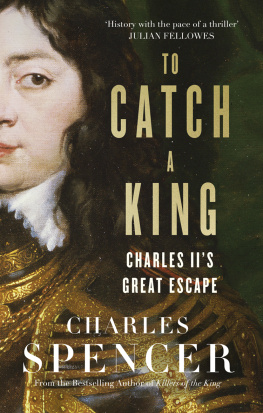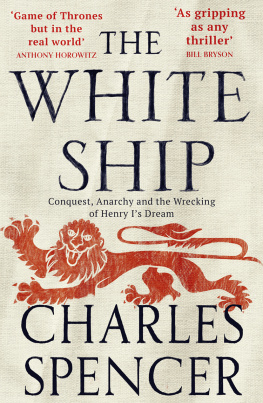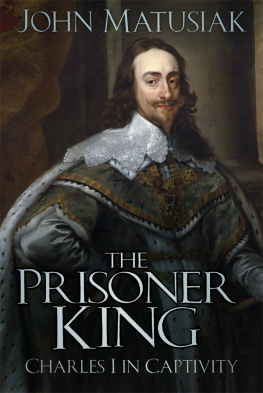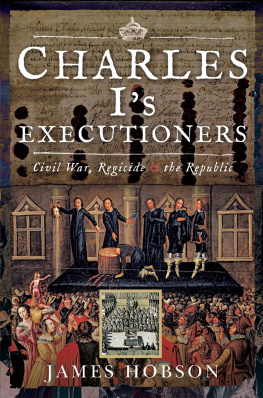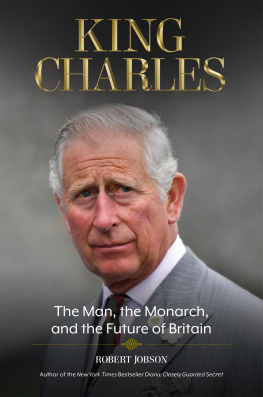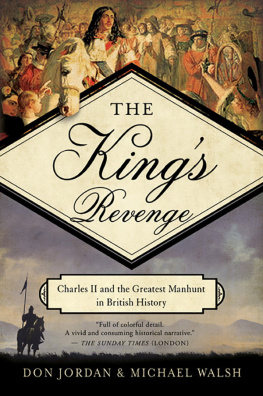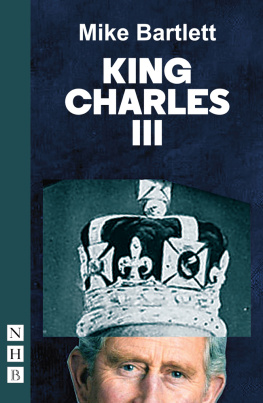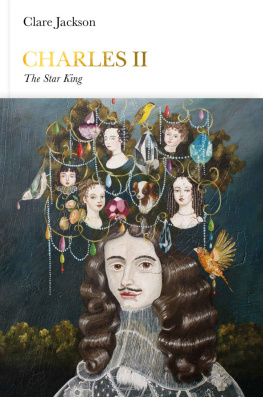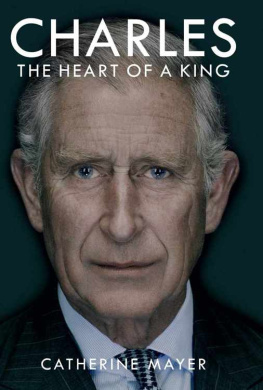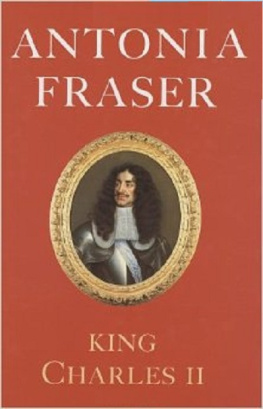William Collins
An imprint of HarperCollinsPublishers
1 London Bridge Street
London SE1 9GF
www.WilliamCollinsBooks.com
This eBook first published in Great Britain by William Collins in 2017
Copyright Charles Spencer 2017
Charles Spencer asserts the moral right to be identified as the author of this work
A catalogue record for this book is available from the British Library
Cover illustration Royal Collection Trust/ Her Majesty Queen Elizabeth II 2017
Map by John Gilkes
All rights reserved under International and Pan-American Copyright Conventions. By payment of the required fees, you have been granted the non-exclusive, non-transferable right to access and read the text of this e-book on-screen. No part of this text may be reproduced, transmitted, down-loaded, decompiled, reverse engineered, or stored in or introduced into any information storage and retrieval system, in any form or by any means, whether electronic or mechanical, now known or hereinafter invented, without the express written permission of HarperCollins.
Source ISBN: 9780008153632
Ebook Edition October 2017 ISBN: 9780008153656
Version: 2017-08-21
For Karen
Contents
I know how men in exile feed on dreams.
Aeschylus
King Charles II had a favourite story. It was about the six weeks when, aged twenty-one, he had been on the run for his life. Those hunting him down had included the regicides those responsible for his fathers trial and beheading who feared him as a deadly avenger; the Parliamentary army, who viewed him as the commander of a defeated, foreign, invasion; and ordinary people, because upon his head sat not the English crown of his birthright, but a colossal financial reward.
This brief period of Charles IIs life stood alone for many reasons. While there were many other times when the bleak reality of his situation fell well short of any reasonable princely expectations, it marked the low point of his fortunes, both as man and royal dignitary. It was uniquely exhilarating for him, in a way that only a genuine life-or-death tussle could be. And it showed off personal qualities that were not always evident in an individual whose self-indulgence and sense of entitlement could infuriate even his most loyal devotees. In his hour of greatest danger, he was proud to note, had arisen within him a quickness of wit, an adaptability, and a hard instinct for survival, that had saved his neck.
In the spring of 1660 Charles returned to England, to claim his throne, on a ship whose figurehead of Oliver Cromwell had hastily been removed, and whose name had been changed from the Naseby (the battle that had been his fathers most punishing defeat) to the Royal Charles. Samuel Pepys was a fellow passenger, and wrote in his diary for 23 May 1660 of how: Upon the quarterdeck he [Charles] fell into discourse of his escape from Worcester, where it made me ready to weep to hear the stories that he told of his difficulties that he had passed through, of his travelling four days and three nights on foot, every step up to his knees in dirt, with nothing but a green coat and a pair of country breeches on, and a pair of country shoes that made him so sore all over his feet, that he could barely stir.
In the subjects of the kingdom that he had been allowed suddenly and unexpectedly to gain, Charles had found a fresh audience for his pet tale. They would hear repeatedly of their new young kings exploits. Not that Pepys complained, for the retelling of events that had taken place when he had been a young man of eighteen, six months into his first year at Cambridge University, particularly intrigued him. They awoke, in this most famous of English diarists, the tracking instincts of an investigative journalist. He decided to check how much of the kings recollections of the six weeks adventure were true, and to what extent they had been seasoned by royal fancy, or compromised by forgetfulness.
Two decades later, during one of the royal courts stays in Suffolk for the horse-racing on Newmarket Heath, Pepys managed to obtain an audience with the king. In his scratchy shorthand (his eyesight had been failing for more than a decade) he took down what Charles remembered of the most electrifying time of his life. Riveted by what he had heard, Pepys quickly secured a second session, his manuscript revealing additions where he included fresh details that Charles had forgotten the first time round.
Meanwhile Pepys resolved to trace those still alive from the motley bunch that had helped the king on his journey from shattering defeat to miraculous delivery. An exceptionally busy man, being at different times a Member of Parliament for two constituencies, and Chief Secretary to the Admiralty, Pepys had hoped to piece together the whole, correct, version of the astonishing tale of escape, and present it as the definitive account. It appears that he had completed almost his entire collection of relevant documents by December 1684, two months before Charless sudden death at the age of fifty-four, for that was when he had it bound. A few additions were kept with this volume, including Colonel George Gunters report, which arrived at some point during the first seven months of 1685.
There is a paragraph, near the start of Colonel Gunters offering, which underlines the way in which those intimately involved in Charless escape attempt felt they had been chosen, for whatever reason, to be participants in an event whose eventual outcome had been determined by God. Gunter wrote:
Here, before I proceed in the story, the reader will give me leave to put him in mind, that we write not an ordinary story, where the reader, engaged by no other interest than curiosity, may soon be cloyed with circumstances which signify no more unto him but that the author was at good leisure and was very confident of his readers patience. In the relation of miracles, every petty circumstance is material and may afford to the judicious reader matter of good speculation: of such a miracle especially, where the restoration of no less than three kingdoms, and his own particular safety and liberty (if a good and faithful subject) was at the stake.
Pepys was not in awe of royalty to anything like the same degree as Colonel Gunter. He had been in the crowd at the beheading of Charles I on 30 January 1649, and it is clear that he had some sympathy with the ruthless Parliamentary justice meted out that day. During his time as a naval administrator he never shirked from locking horns with Royalists if, in his view, they were holding back the progress of the service. His disagreements with Prince Rupert of the Rhine, the poster boy of the Crowns cause in his youth, and Lord Admiral of England in middle age, show a lack of deference to those of the highest birth if he judged them to be wrongheaded, and therefore dangerous to the nation. Pepys was a loyal patriot, but not a fawning one. He therefore makes for an appealing midwife in the delivery of the kings tale.
There was a great appetite for this unique royal story during the kings lifetime, even amongst his most intimate circle. James, Duke of York, wrote to Pepys in the middle of 1681, saying he wanted to read for himself his elder brothers description of his time on the run after the defeat at Worcester. It was his second time of asking this favour of Pepys. Even though the duke promised not to take a copy of the account, Pepys dared to set out that this was a journalistic project that was still very much in progress, and one that he felt especially protective of: My covetousness of rendering it as perfect, as the memory of any of the survivors (interested in any part of that memorable story) can enable me to make it, he wrote, has led me into so many and distant enquiries relating thereto, as have kept me out of a capacity of putting it together as I would, and it ought, and shall be, so soon as ever I possess myself of all the memorials I am in expectation of concerning it. Which I shall also (for your Royal Highnesss satisfaction) use my utmost industry in the hastening.

